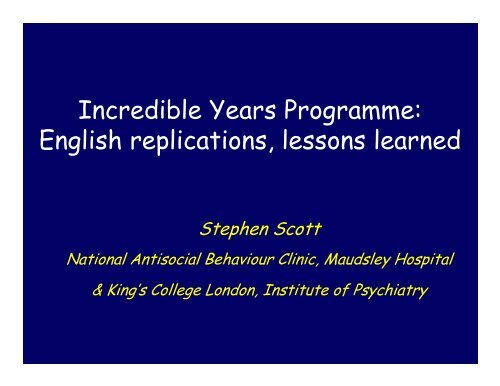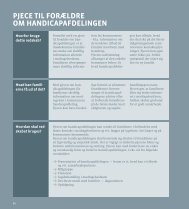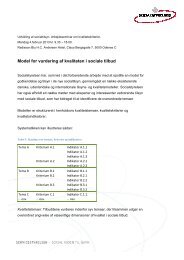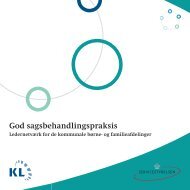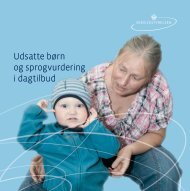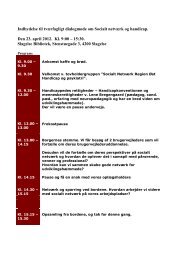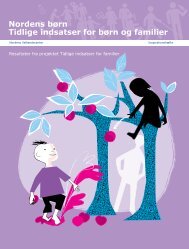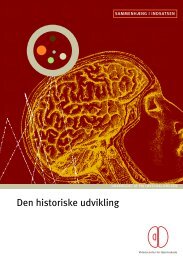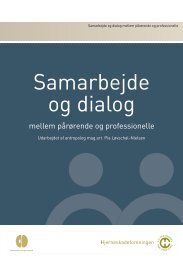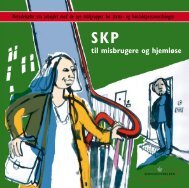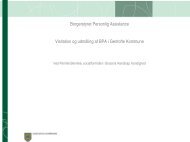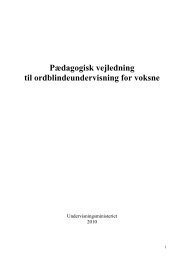Incredible Years Programme: English replications, lessons learned
Incredible Years Programme: English replications, lessons learned
Incredible Years Programme: English replications, lessons learned
- No tags were found...
You also want an ePaper? Increase the reach of your titles
YUMPU automatically turns print PDFs into web optimized ePapers that Google loves.
! " #$ %&
INTRODUCTIONTwo kinds of research:• Traditional research about Causes= What causes things to be this way– eg why some children are difficult and underachieve• Newer research about Intervention= what works to change the concern– Eg individual therapy with child vs parenting• Policy makers and professionals need both
<strong>Incredible</strong> <strong>Years</strong> Parents, Teachersand Children’s Programs ObjectivesShort Term Objectives• To prevent and reduce aggression andbehavior problems in young children.• To promote social, emotional and academiccompetence in young children.Long Term Objectives• To prevent delinquency,substance abuse andviolence in adolescence.
Continuity of anti-social behaviour from age 5 to 17. Source: Scott 2002Escape% of allchildren151/54/51/5105Oppositional &defiantBlamed byparentsDisliked bysiblingsGets into fightsRejected by peersLow self esteem4/5Hard to controlPoor schoolachievementsBlames othersStealing andtruantingDeviant peergroup1/54/51/54/5Career offenderUnemployedAntisocial attitudeDrug misuse010% 10% 10% 10%5 years 8 years 11 years 14 years 17 yearsNo past antisocial behaviour
Outcomes at age 25 by how antisocial aged 7(Fergusson et al 2005)Age 7AntisocialViolentoffendingDrugdependtTeenParentNo qualifcationsOnwelfareTop 5%352020523380-95%121614221450-80%68814120- 50%35469
' # ())*+Mean cost £ 1998
! , - . , #! %/ 0 1 0 , - 2 . , % ( . !/ (0 ' ( ! . +" , # # $& !$- ' (+/ 3 . 4 %%, 2 + . , % ! 6 , 2 0+0 %! 0 . 6 . + !" # ! $%&' !( ) " *+5 7 *8
Research evidence on “Good Parenting”(Pettit et al 2003)• Encouraging desirable behaviour & strengths(rather than just stopping undesirable behaviour)• Sensitively responding to child’s needs(rather than ignoring their signals)• Setting firm limits consistently and calmly(rather than exploding unpredictably and withvenom)• Parenting also involves transmission of values,and selecting of environments
TeacherProgramThe <strong>Incredible</strong> <strong>Years</strong>Training SeriesAges 2-8 yearsChildDinosaurProgram:TreatmentChildDinosaurProgram:ClassroomBASICParentProgramADVANCEParentProgramACADEMICParentProgram
Living ConditionsMental Health,CriminalitySupportiveRelationshipsOwn UpbringingDaily HasslesIntellectual Ability
! 9 &&4'):5+; %&& < = > ! ' ())?+@> , A&! 6 ' 9 ())8+; :> ' ())?+; && B > 3 B:'/ ())8+> 6 1 'C && ())5+
Who should receive theprogram?Treatment:Offered in clinic fordiagnosed childrenPrevention:Offered in community tohigh risk populations
Methods in parenting programmePARENTINGPYRAMIDTimeOutIgnore,redirect, distract:Decrease AggressionEffective Limit Setting:Increase CooperationUseSelectivelyUseLiberallyPraise & Incentives:Build Social CompetencePlay: Promote PositiveParent-Child RelationshipsThe <strong>Incredible</strong> <strong>Years</strong> Training Series 3/00
Video vignette of play
<strong>Incredible</strong> <strong>Years</strong> Parent ProgramEffectiveness Treatment of Conduct Problems8 randomized control group evaluations by developer5 independent <strong>replications</strong>Spaccarelli (1992) (USA); Scott (2001) (UK); Taylor (1998) (Canada);Morsch (2005) (Norway); Hutchings (ongoing) (Wales)Found:• Increases in positive parenting• Decreases in harsh disciplineReductions in conduct problems• 2/3 of children in normal rangeat 3-year follow-up
' ())*+; *?* 5:D& ! ; '9 *E +; F $> 9 59 B&; ; " 9 ; ;
Child Antisocial BehaviourPACS Interview Score21.510.51.91.82 1.870.75 0.750Pre Post 1 YearWaiting ListParent Group
1 && & & ' +*G 0 ' / H +(G . 5G ! '3 ())8+& ' # ())*+
0' (/ ( !# 0# 0- $ !# $(/ ($1" 0# 2(" 0 13" " 456• 7 1• . 1 4• (1 5• 115 ) • - 1 885 5• 9 : 8
1 ; 15 < 0 " ! 57 1.21.11GroupHelpline0.90.8PrePost
1, 4 54< 0 " ! 57 " 0.650.60.550.5GroupHelpline0.450.4PrePost
1' =; " ' < months difference86420-2GroupHelpline-4PrePost
<strong>Programme</strong>s that work( similar to NICE 2006)• Use evidence-based content with a manual• Target accurately – not carpet bombing small areas• Engage a substantial proportion of the population• Keep attendance for at least 8-10 sessions/20 hours• Ensure quality through training and supervision• Evaluate, review, change practice
(1) Use evidence-based programmesEffect sizes av 0.6with EB progs (Barlowet al 2002) Effects 0-0.2 otherwiseEg Fort Bragg,Homestart,0.60.50.40.30.2Oxford Home Visiting0.1(Weisz et al 1998) 0not EBEv-Based
(2) Target accuratelyImprovement in antisocial behaviour, according to initialseverity level (Scott 2005)Clinical trial worst 2%SPOKES prevention trialtargeting worst 20%PALS preventiontargeting bygeographical areaM e a n Z s c o r e3.532.521.510.501st 2nd 3rd 4thInitial severity by quartileBeforeFollow up
(3) Be engaging!Percent initialenrolment (prevention)depends on trust &liking, and:• Accessible• Available• Affordable• At convenient time(after Pugh 1997)50454035302520151050AveBest
(4) Keep attendance upChanges in SensitiveResponding accordingto number of sessionsAttended in PALS trial(Scott, O’Connor & Futh inPress)1312.51211.51110.5109.59BeforeFollow UpControlAttend 5+All allocated
(5) Quality, quality, qualityChild outcome and professional skill1.21child aggressionimprovement0.80.60.40.20-0.2lowest lower third middle third upper thirdSkill of professional in delivering programme
(6) Build in evaluation and review• For some areas, do Randomized Controlled Trials toanswer questions eg how many sessions are enough,which programmes have which effects, etc– Not to do so is to set out to sea without a map– This is not a luxury, it is prudent and cost- saving• For all areas, collect pre-post data on effectiveness,measure whole population – otherwise you don’t knowwho you are excluding; eg use SDQ
A Parenting Academy(Tony Blair, 2006)• Train professionals• Disseminate the 6 principles• Courses in wide range of programmes• Cover age range• Follow up supervision, monthly• Roll out good practice to existing staff
What is stopping us ?• Tradition: the Sinatra approach (no regrets)• Threat to status• “Behaviourism is mechanical”– But SLT is systemic & interactional– It acknowledges emotions– It is about relationships– We all respond to approval and rewards• Lack of evaluation in social sciences– But you wouldn’t buy a car without an evaluation –is itmore important than children?• Evaluations ask parents if they liked it– But is it moral to let children be damagedunnecessarily?


